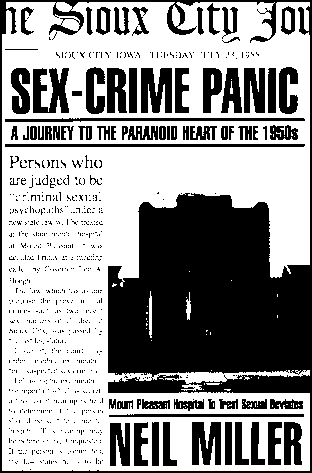Paranoid Heart of
The 1950s
Neil Miller
(Alyson)

sentenced to the state mental hospital at Mount Pleasant for an indefinite period of time --- until they were "cured."
Miller calls it a "sex crime panic," accomplished by means of a newly passed law which was "to provide for the confinement of persons who are dangerous criminal sexual psychopaths."
The narrative follows the main suspect in these murders (he was drugged to force confession), and details the incarceration of the twenty "sexual psychopaths." We follow them in their capture, spirited (and illegal) interrogations, their difficulty in getting legal help, and, finally, their sentencing to the Iowa State Insane Asylum at "Mount Pleasant" (great name!)
As was typical of the time, there was no distinction between "sexual deviates" and dangerous sex criminals. Miller tells us that
an adult homosexual man who had sex with his lover in the privacy of his bedroom was as deviate as a child murderer. A person who had a pornographic book or photograph hidden in a night table faced the same punishment as a rapist.
If the casual reader has no idea of the treatment of homosexuals a half-century ago, Sex-Crime Panic is sure to be an eye-popper. But despite the lurid title and sometimes breathless treatment of the subject, those of us who lived through those days expected nothing less from the authorities.
We knew that the manifestation of the love "that dare not speak its name" was a felony; we knew the price of exposure --- we knew that if we were ensnared (a potential lover might pull out a badge instead of a weenie) --- we faced time in jail or at the "funny farm." We were the enemy, a representative of a moral decay that was haunting a pure nation.
Freedom might be found in New York or Chicago or San Francisco or New Orleans. But those of us who lived in Pittsburgh or Dallas or Boise or any small town knew we were taking a chance when we tried to find love. It was a bitter time. Those of us who had no place to turn in our own communities hoped that by leaving we could find a city where we would just be left alone. That was all that we could hope for.
Miller reports that once the "deviates" got salted away in Mount Pleasant, the majority of them played along with the psychologists, pretending that they were "cured" so they could be released. Indeed, one of them was out within three months; the rest within a year. The author tells us that they were lucky that they were not forced to undergo castration or insulin injections --- the accepted "cure" in some other states.
Most of their lives were severely disrupted. Any who had to go through extensive background checks for new jobs knew that they would not be hired. Almost all left family and friends and moved out of state.
It's a credible (and incredible) story. Miller has done his homework, even visiting with the psychologists who worked at the state mental hospital and, most interesting of all, interviewing some of the detectives who entrapped the luckless twenty. The book is of special interest to me because, about that time, I tried, hesitatingly, to come out of the closet. Thank god I didn't do it in Sioux City.
I left a dull marriage and moved to Washington, D.C. During the days I worked in a respectable office; in the evenings I hung out at a bar called "The Chicken Hut." The bar, like us, was a Hydra. It was a government- One weekend in late 1958, I was invited to a private party. I was told that Liberace was going to be there. At midnight, when the joint, in the parlance of the times, was jumping --- it was raided. Almost eighty men were arrested. For the delectation of the public, their names, addresses, and jobs were listed the next morning, entire, in the august Washington Post. Neither Liberace nor I were there. The story that came out later was that he had been forewarned, which was not an improbable event, given the times and the nature of the D. C. police. My reason for not attending was simpler. I detested Liberace's music and his flagrant ways. I had not yet learned to forgive --- much less enjoy --- those who were parodying my newly acquired life-style. I was also acutely uncomfortable at parties which were noisy at best, hysterical at worst. I begged off --- fortunately for me and my future as a lawyer and judge and state senator.